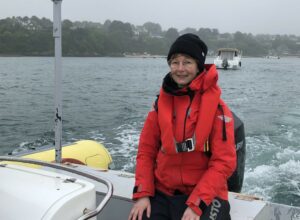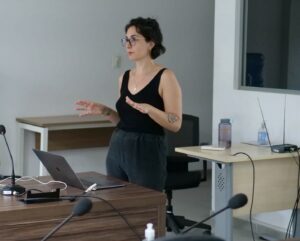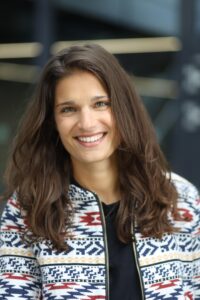The sea – A matter of concern for science and technology studies
When we think of the sea and marine worlds, we often conjure up a variety of images, emotions, and associations. The sea has long captured the imagination of poets and writers, given its vastness and majesty and how it teems with diverse forms of marine life. More prosaically, it has played an important role in global work, trade, and colonization. This is reflected in some earlier STS work that has been foundational for the field. The seminal scallops-study of Michel Callon (1999) not only established an early account of marine-human relations, and the tensions between science and the fishery sector, but, notably, a methodology for actor-network-theory based on the translation practices between different human and non-human entities. John Law (1987) developed an early account through his study of the material forces as a core precondition for the Portuguese expansion on the African continent in the 17th century. Reading this expansion through the contemporary achievements and limits of maritime technology and engineering exemplified STS’ radical critique of classical sociological human-centered and power-driven approaches.
Today, anthropogenic pressure on coastal areas, rising sea levels, overfishing, and loss of marine biodiversity impact the marine sciences (Helmreich 2023), as well as global society (Hastrup & Hastrup 2015) on a formerly unknown planetary scale. Despite efforts to establish protected marine areas since the latter half of the 20th century, given growing awareness of marine pollution and overfishing, “the world’s oceans are in danger” (Plumer 2019) – an alarming realization. Consequently, current STS-research on the marine realm has shifted perspective from observation towards collaboration, thus seeking “contributory expertise” (Collins & Evans 2002) regarding the existential threats to the ocean and its inhabitants (Asdal & Huse 2023). We see a similar shift in marine science, which has traditionally been dominated by the natural and the engineering sciences. On the one hand, researchers seek to include “society” and societal expertise within their research, as exemplified in the current Ocean Decade’s call for inter-and transdisciplinary research (UNESCO-IOC 2021). On the other, Marine Social Sciences (MSS) has emerged as an international research field in its own right (Bavinck & Verrips 2020; McKinley et al. 2022), developing socio-cultural research topics on and within marine science. In Germany, MSS has stimulated, in 2017, the establishment of a strategy group “Marine Social and Cultural Sciences” within the Consortium German Marine Research, the largest marine research group within KDM. However, marine STS and ANT, either within MSS, or STS or marine research more generally, remains only weakly organized. Building on the momentum of the recently established ststing e.V., founded in 2019 (Helm et al. 2021), and intensive discussions within German MSS, the formation of a working group on “marine STSing” was deemed crucial.
Our ‘doings’
Our group brings together specialists from the marine humanities with STS scholars to discuss STS methodologies within our respective research fields. Within stsing e.V. we create inspiring entanglements between marine research communities, which are mostly separated by disciplines and research topics. We started in the early summer of 2022 with an online reading group and regularly held online meetings every two months and discussed “classical”, as well as contemporary papers at the intersection of marine social and cultural sciences and STS. We have invited senior STS-scholars such as Stefan Helmreich, Caspar Bruun Jensen, and Kimberley Peters to discuss their current works on marine realms with us. In June 2023, some Marine-STSing-members met at the biennial MARE-conference in Amsterdam to discuss our research with international colleagues. We have strengthened the group’s coherence by fostering less hierarchical relationships between senior and younger scholars, in-depth-reading and discussion of current works and papers, and continuous announcement and networking through Mattermost, as well as within the German sociological, anthropological, geographical communities.
Having established an online platform and safe space for exchange among marine STS scholars from various disciplines and fields, members of the group have also organized events. In December 2021, twelve members of the group met at Goethe University Frankfurt to discuss “Who cares for marine environments, climate change and responsibility in the Anthropocene and how?”. In March 2023, some group members organized and chaired the double-panel on “Ocean Forms/Events – Exploring Maritime Flows and Productions of Knowledge” at the STS-Hub Conference on the topic of “circulations” at RWTH Aachen University and in March 2024 group members organized and hosted the panel ““(Un)leaking marine and coastal ecosystems” at the inaugural conference of stsing titled “Leakage” at TU-Dresden. Some of us will be present at the upcoming EASST/4S-conference in Amsterdam as well. A webpage on our research, publications and activities is currently in preparation.
We also hold regular sessions to share and discuss papers written by group members on a monthly basis, who have disciplinary backgrounds in anthropology, human geography, sociology, political sciences, philosophy and disaster risks studies. Exploring marine STS through multiple “classic” and contemporary approaches, concepts, and methods, we tackle it as ‘a doing in itself’, as we co-produce the ocean and knowledge about marine environments and lifeworlds (Siriwardane-de Zoysa & Hornidge, 2016) by studying them. The papers reflect the diversity of the research field; we have discussed, among other things, the role of seagrass and turtles in the conservation of marine habitats, learned more about the practices and routines on research vessels and the idea of field research shared between biology and ethnography, and discussed how modeling oceans can be understood through a STS lens, to list but a few examples. Our upcoming activities confirm one of the main goals of the group, namely, to be an open space where different epistemic cultures and disciplines meet, with presentations to be given by mathematicians as well as by experts from within the field of fisheries.
In the long run, we aim to include more natural scientists, technicians, and engineers working on marine realms with the purpose of developing practical nature-society-based solutions that recognize the trade-offs between economic and ecological interests, combining STS-marine social sciences with critical sociologies of knowledge. We also wish to strengthen marine social science on diverse academic and institutional levels in Germany and beyond. This is why we are seeking to grow the marine STSing group, to create new waves of knowledge for the future, expanding out from academia to civil society and policy making. Our research topics and sites span as far as the Arctic to the Indian Ocean, from the Baltic to the Caribbean Sea, from the Pacific to the Atlantic. We are looking forward to seeing who will join the rising tide of interest!
Contact: Ramona Haegele Ramona.haegele@uni-wuerzburg.de
References
Asdal K. and Huse, T. 2023. Nature-Made Economy: Cod, capital and the great economization of the ocean. MIT Press.
Bavinck, M. & Verrips, J. 2020. Manifesto for the marine social sciences, Maritime Studies 19: 121-123. https://doi.org/10.1007/s40152-020-00179-x.
Callon, M. 1999. Some elements of a sociology of translation. Domestication of the scallops and the fishermen of Saint Brieuc Bay. In M. Biagioli (ed.), The Science Studies Reader (pp. 67-83). Routledge.
Collins, H. & Evans, R. 2002. The third wave of science studies. Studies of expertise and experience. Social Studies of Science 32/2: 235-296. https://doi.org/10.1177/030631270203200200.
Hastrup, K. & F. Hastrup, F. (eds.) 2015. Waterworlds. Anthropology in Fluid Environments. Berghahn Books.
Helm, P., Kocksch, L. & Sørensen, E. 2021. Staying with the troubles of infrastructuring stsing: between assemblage and “Verein”. EASST Review, 40/2. Retrieved from: https://easst.net/article/staying-withthe-troubles-of-infrastructuring-stsing-between-assemblage-and-verein/
Helmreich, S. 2023. A Book of Waves. Durham, NC: Duke University Press.
Laffoley D, Baxter JM, Amon DJ, Claudet, J, Hall-Spencer, JM, Grorud-Colvert, K, Levin, LA, Reid, PC, Rogers, AD, Taylor, ML, Woodall, LC, Andersen NF. 2021. Evolving the narrative for protecting a rapidly changing ocean, post-COVID-19. Aquatic Conservation: Marine and Freshwater Ecosystems, 31: 1512–1534. https://doi.org/10.1002/aqc.3512
Law, J. On the Social Explanation of Technical Change: The Case of the Portuguese Maritime Expansion. Technology and Culture, 28/2: 227-252. https://doi.org/10.2307/3105566
McKinley, E., Kelly, R., Mackay, M., Shellock, R., Cvitanovic, C., & Van Putten, I. 2022. Development and expansion in the marine social sciences: Insights from the global community. Iscience, 25/8. https://doi.org/10.1016/ j.isci.2022.104735
Plumer, B. 2019. The World’s Oceans Are in Danger, Major Climate Change Report Warns. The New York Times. 25.09.2019. Retrieved from: https://www.nytimes.com/2019/09/25/climate/climate-change-oceans-united-nations.html
Siriwardane-de Zoysa R. and Hornidge AK. 2016. Putting Lifeworlds at Sea: Studying Meaning-Making in Marine Research. Frontiers in Marine Science, 3:197. doi: 10.3389/fmars.2016.00197
UNESCO-IOC. 2021. The United Nations Decade of Ocean Science for Sustainable Development, (2021-2030) Implementation plan – summary (Paris: UNESCO). (IOC Ocean Decade Series, 19.).
Author biographies
Tanja Bogusz is currently PI of the FIELDS research project “Experiencing nature and society. A multi-sited inquiry into marine and ethnographic fieldwork” (BO 3268/4-1) at the Center for Sustainable Society Research at Hamburg University, Germany. She co-founded stsing e.V, Doing Science and Technology Studies within and through Germany, and the marine stsing group. She is co-speaker of the strategy group Marine Social and Cultural Sciences within the Consortium German Marine Research (KDM), member of the think-tank Future Forum Ocean within the KDM, as well as appointed member of SCOR – Scientific Committee on Oceanic Research.
Ramona Haegele is a researcher at the Department of European Ethnology at Wuerzburg University and an associate researcher at the German Institute of Development and Sustainability (IDOS). After graduating in social and cultural anthropology and political science in Vienna, Duisburg, and Seoul, she is currently doing her PhD in sociology at the University of Bonn. She is investigating processes of interdisciplinary knowledge production in marine carbon observations with a focus on the Baltic Sea and the Brazilian coast. Ramona is a founding member of the marine STSing group, and her research is situated at the intersection of STS, political geography, and social anthropology.
Laura Otto holds the junior professorship for the Anthropology of the Rural at Wuerzburg University, Germany. Her research focuses on coastal transformations, particularly in the Caribbean, where the arrival of massive algae blooms has generated vast-reaching socio-ecological transformations since 2011. Laura is a founding member of the marine STSing group, and her expertise includes ethnographic methods, STS theory, as well as marine cultural studies.


